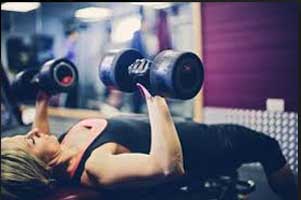- Home
- Editorial
- News
- Practice Guidelines
- Anesthesiology Guidelines
- Cancer Guidelines
- Cardiac Sciences Guidelines
- Critical Care Guidelines
- Dentistry Guidelines
- Dermatology Guidelines
- Diabetes and Endo Guidelines
- Diagnostics Guidelines
- ENT Guidelines
- Featured Practice Guidelines
- Gastroenterology Guidelines
- Geriatrics Guidelines
- Medicine Guidelines
- Nephrology Guidelines
- Neurosciences Guidelines
- Obs and Gynae Guidelines
- Ophthalmology Guidelines
- Orthopaedics Guidelines
- Paediatrics Guidelines
- Psychiatry Guidelines
- Pulmonology Guidelines
- Radiology Guidelines
- Surgery Guidelines
- Urology Guidelines
Strength training may reduce hot flushes in post menopausal women, finds clinical trial

Strength training may reduce hot flushes and night sweats in post menopausal women , finds a new clinical trial.
Women may stave off unpleasant symptoms like hot flushes and night sweats through strength training by using weights encountered aft
Strength training or Resistance training is supposed to be beneficial and is already recommended for all women.The study finds that it is effective for hot flushes around menopause also.
Most women experience vasomotor symptoms like hot flushes (HF) and night sweats around menopause that may impair quality of life (QoL) .Although oestrogen therapy with or without a progestogen (HT) is an effective treatment, its use was restricted after reports associating HT with breast cancer and cardiovascular events . Pharmacological options are few and not as effective as Hormone therapy.
Some studies suggest that exercise may help quell post menopausal symptoms like hot flushes , but others have found no effect.
Dr. Emilia Berin of Linkoping University in Sweden,and colleagues randomly assigned 58 women experiencing at least four moderate-to-severe hot flushes or night sweats daily to 15 weeks of resistance training or to a control group whose members did not change their physical activity. None of the study participants exercised regularly before the trial and none had used hormone therapy in the prior two months.
The workout group's regimen included three weekly 45-minute sessions, with six exercises on resistance machines and two using body weight. Women worked out with lighter weights for the first three weeks, then with progressively heavier loads.
The exercise group averaged 7.5 hot flashes or night sweats a day at the beginning of the study, and after 15 weeks were having an average of 4.4 episodes a day. There was virtually no change in the control group participants, who went from 6.6 to 6.5 hot flashes daily.
The researchers concluded thata 15-week resistance-training program decreased the frequency of moderate and severe hot flushes among postmenopausal women and could be an effective and safe treatment option to alleviate vasomotor symptoms.
The training program was challenging for the study participants, Berin noted in a phone interview. "To actually push themselves harder than they were used to was new to them. They had to be encouraged to increase the load more so they would get the effects of the training," she said. "After they progressed, they enjoyed it and almost everyone continued to exercise after the intervention."
The findings of the research may open new vistas for women who suffer from hot flishes but can't take hormones including breast cancer patients.In all such patients resistance training and strength training may come handy.
For further reference log on to

Disclaimer: This site is primarily intended for healthcare professionals. Any content/information on this website does not replace the advice of medical and/or health professionals and should not be construed as medical/diagnostic advice/endorsement or prescription. Use of this site is subject to our terms of use, privacy policy, advertisement policy. © 2020 Minerva Medical Treatment Pvt Ltd